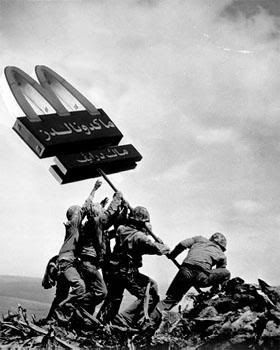From an address to a joint session of the US Congress: President George W. Bush.
"Americans are asking ``Why do they hate us?'' They hate what they see right here in this chamber: a democratically elected government. Their leaders are self-appointed. They hate our freedoms: our freedom of religion, our freedom of speech, our freedom to vote and assemble and disagree with each other. " George W. Bush, 20 September, 2001
http://www.indystar.com/library/factfiles/crime/national/2001/sept11/transcripts/0921bush.htmlFrom Goebbels' New Year address to Germany
They hate our people because it is decent, brave, industrious, hardworking and intelligent. They hate our views, our social policies, and our accomplishments. They hate us as a Reich and as a community. They have forced us into a struggle for life and death. We will defend ourselves accordingly. All is clear between us and our enemies. Goebbels 31 December 1939
http://www.calvin.edu/academic/cas/gpa/goeb21.htm
The Enron-Cheney-Taliban Connection?
By Ron Callari, Albion Monitor. Posted February 28, 2002.
Could the Big Secret of the Enron scandal be that Cheney and the White House were working closely with the Taliban -- on Enron's behalf -- up to a few weeks before Sept. 11? 1: Starting in the mid-1990s, Unocal and its partners planned to build a 1,000 mile gas pipeline from Turkmenistan to Multan, Pakistan. Cost: about $2 billion (all pipeline routes shown are very approximate). Also considered was a more difficult route from Iran to Multan, which is not shown here.
1: Starting in the mid-1990s, Unocal and its partners planned to build a 1,000 mile gas pipeline from Turkmenistan to Multan, Pakistan. Cost: about $2 billion (all pipeline routes shown are very approximate). Also considered was a more difficult route from Iran to Multan, which is not shown here.
2: A proposed 400-mile extension from Multan to New Delhi would bring some of the ultra-cheap gas into India's network of gas pipelines. Cost: $600 million.
3: The HBJ pipeline carries most of India's liquid natural gas.
4: Hazira, north of Bombay, is the end of the HBJ pipeline. But in 1997, Enron announced plans to link Dabhol to the Hazira terminal. Enron also said they were going to add to about 1500 miles to the HBJ pipeline. Costs: $300 million and $900 million, respectively.
5: Any gas pipeline across Pakistan could have a spur to the seaport of Gwadar, where tankers could take gas to Korea and Japan, largest consumers of liquid gas in the world. A sea route from Gwadar to Dabhol would be even easier....Could the Big Secret be that the highest levels of the Bush Administration knew during the summer of 2001 that the largest bankruptcy in history was imminent? Or was it that Enron and the White House were working closely with the Taliban -- including Osama bin Laden -- up to weeks before the Sept. 11 attack? Was a deal in Afghanistan part of a desperate last-ditch "end run" to bail out Enron? Here's a tip for Congressional investigators and federal prosecutors: Start by looking at the India deal. Closely.
Enron had a $3 billion investment in the Dabhol power plant, near Bombay on India's west coast. The project began in 1992, and the liquefied natural gas- powered plant was supposed to supply energy- hungry India with about one-fifth of its energy needs by 1997. It was one of Enron's largest development projects ever (and the single largest direct foreign investment in India's history). The company owned 65 percent of Dabhol; the other partners were Bechtel, General Electric and State Electricity Board.
The fly in the ointment, however was that the Indian consumers could not afford the cost of the electricity that was to be produced. The World Bank had warned at the beginning that the energy produced by the plant would be too costly, and Enron proved them right. Power from the plant was 700 percent higher than electricity from other sources.
Enron had promised India that the Dabhol power would be affordable once the next phase of the project was completed. But to cut expenses, Enron had to find cheap gas to fuel it. They started burning naphtha, with plans that they would retrofit the plant to gas once it was available.
Much more on the pipeline through Afghanistan at:
http://www.alternet.org/story/12525/![]()
